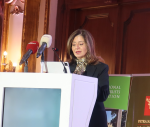You are here
Under public scrutiny
Jan 22,2018 - Last updated at Jan 22,2018
Who among us remembers the Iranian revolution of 1979? It started off as secular poetry readings and protests against the enormous gap that developed between rich and poor, brought about by Iran’s colossal oil revenues during the boom years. Social tensions were exacerbated as the recession set in 1975, but the focus remained socio-economic. It was not until 1977 that the clerics came onto the scene, and in 1979 the Shah, already dying of cancer, fled the country.
The Islamic Republic that seized power did not solve Iran’s economic problems, and very soon the new leader, Ayatollah Khomeini faced protests against deteriorating living conditions, just as the regime which he founded does today. But the ayatollah rebuked the protesters for being concerned with their standard of living. The purpose of the revolution, he admonished, was to fight the Great Satan not to bring down the price of watermelons.
This probably sums up the fundamental difference between governments which believe that the people are the source of authority, and those who claim that their authority springs from another source, such as Divine will.
A representative government does not ask people to disregard bread and butter issues, because its mission is purely and entirely to provide the best standard of living for the people. In Jordan, for instance, His Majesty King Abdullah has defined the top priority as being “a better life for all Jordanians”.
Officials in a representative government are public servants, entrusted with the management of public resources. This is why they need to be constantly under public scrutiny. Public servants make very complex decisions that affect the public’s livelihood, so their qualifications should include academic credentials, ethical standing, probity, commitment and empathy with the people. Also, public office is such that there is no statute of limitations for wrongdoing by public officials. In Germany, for instance, two ministers had to resign when it was discovered that, as students, they had plagiarised their doctoral theses.
But what happens when a society has conflicting public moralities? In Jordan, for instance, there are good laws that highlight the country’s seriousness in fighting abuse of authority, and misuse of public funds.
At the same time, this is a tribal society, where the tribe supports its sons right or wrong. As a friend of mine put it, “no matter what he has done, he is one of us so we protect him. On this point, a university professor of law and an illiterate ruffian are of one mind. They pick up a brickbat and whatever firearm they find handy and jump into the pickup truck ready for action.”
This is the challenge facing not only Jordan but every society in the world. When accountability is not enforced seriously and credibly, there is no limit, hem or boundary to the avarice and venality of which we humans are capable. And even if corruption is not proven to exist, the perception that it may be present would be a serious handicap to effective government.












